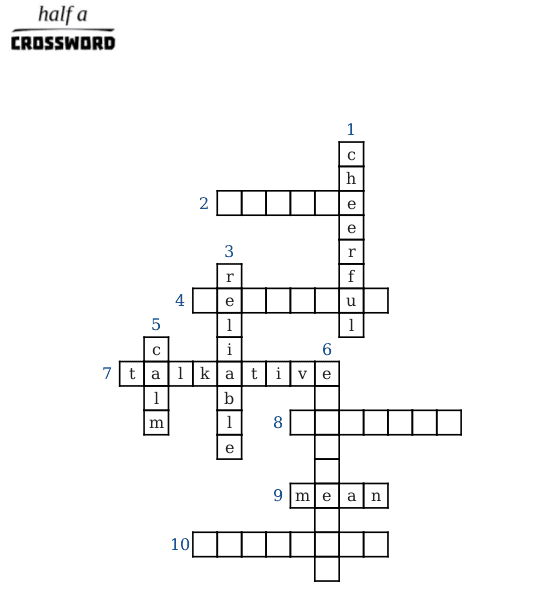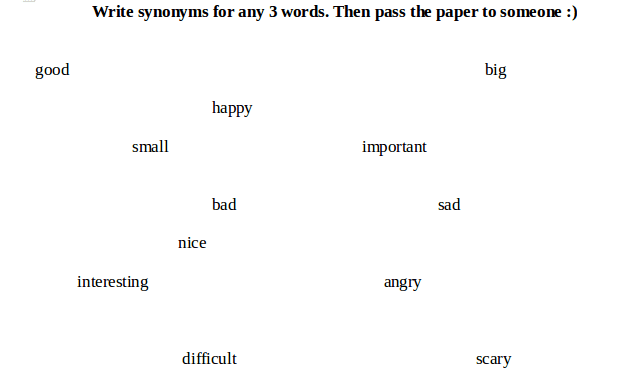Synonyms and antonyms are extremely useful to know because they enhance the overall command of language. However, some of our students might lack this knowledge and get by with just a basic set of adjectives and verbs. Why can’t it be left like that?
- Synonyms and antonyms demonstrate our language proficiency because being able to use various shades of meanings without repeating ourselves helps us get across more precise messages.
- Synonyms and antonyms are crucial for exams because exam tasks involve tons of paraphrasing. The more you know, the higher your result will be as this knowledge enables you to process information faster and be sure to have the right answers.
In today’s article, we will have a look at 5 activities that you can use if you want to enlarge your students’ vocabulary, prepare them better for exams or just get rid of the ever-present ‘good’ and ‘bad’.
- Substitutes
It can work with any kind of text when you want to draw students’ attention to the variety of vocabulary and shades of meaning. Take a text and substitute all target words with a couple of their basic equivalents. If you are learning how to write a review, you can, for instance, replace adjectives like ‘thrilling’, ‘exciting’, ‘thought-provoking’ etc. with ‘good’ and ‘interesting’. If reported speech is in focus, do the same with the synonyms for ’say’ and ‘tell’. Then ask students to read the text and ‘upgrade’ it, substituting basic words with their more sophisticated equivalents. For lower levels, you can underline or highlight the words to be replaced, higher levels can work on their own. This task can be done in pairs as well. You can try Rewordify – the service for simplifying difficult pieces of language automatically.
- Synonym/antonym race
Divide your students into two teams and ask one person from each team to come to the board. Decide if you are going to practise synonyms or antonyms. Then say a word, for example, ‘say’, and see which team can come up with a synonym or antonym first. The first team which writes their word down correctly will get a point. Then invite two new players to the board and play another round with the same word. When students run out of synonyms for ‘say’, you give them a new word.
- Split crossword
This is one of my favourite activities that can be easily adapted for teaching and revising both synonyms and antonyms. In split crosswords students work in pairs and explain words from their half of the crossword to each other. This is, for example, what one part of such a crossword looks like:
Instead of asking students just to explain the words, you can add a twist to that and tell them to use one-word antonymic explanations. If they have to explain ‘talkative’, they can go like ‘quite’ – or ‘reticent’, ‘taciturn’, ‘silent’, depends on the level. The same task can be done with synonyms. To create such crosswords, I usually go to halfacrossword.com, you might want to check this out.

- Write 3, pass around
This activity was described by Penny Ur at her autumn workshop in Rostov-on-Don. Have a list of target vocabulary scattered around a piece of paper. Hand out one copy for each student. Ask them to write down synonyms or antonyms for any 3 of the words given and then pass the paper to some of their group mates. They repeat till there are no words left on the paper.
After the activity is over, you can look through the answers open class and choose the most original or the rarest synonyms. Also, you can compile a list of them and ask students to write it down or to use in some follow-up activity.
This activity involves cooperation and is quite stress-free even for low level or struggling students. As they choose the words themselves, they can pick up the ones they know and feel more confident about. Also, they can spot some new word and copy it while working with the next piece of paper.

- Quiz jar
This revision activity can be run throughout the whole year. Every time you and your students come across some nice set of synonyms or a tricky pair of antonyms, discuss it and write down a question on a small card. The questions vary depending on the level and might be the following:
What’s the difference between ‘famous’ and ‘notorious’?
Can you name 3 synonyms for ‘important’?
Give as many opposites for ‘fake’ as you can.
What’s the opposite of ‘short’ in ‘short dress’? And in ‘short man’?
Choose the word that is most nearly opposite in meaning to the word in capital letters:
HAZARDOUS
A.vivid
B.convenient
C.dangerous
D.secure
E.risky
Store all the question cards and don’t forget to add new ones to a jar or a box. You can use them to run quizzes in teams or just revise briefly, say, at the end of each month.
The last but not least. Besides actually teaching students new synonyms and opposites, it’s a great idea to encourage them to use dictionaries and thesauruses on their own. You can try Collins Thesaurus, for instance, or recommend your students the Thesaurus.com website. Hopefully, it will add some variety to their choice of words and develop their learner autonomy as well.






 Вероника Аветисян
Вероника Аветисян 
 Маргарита Аветисян
Маргарита Аветисян 


